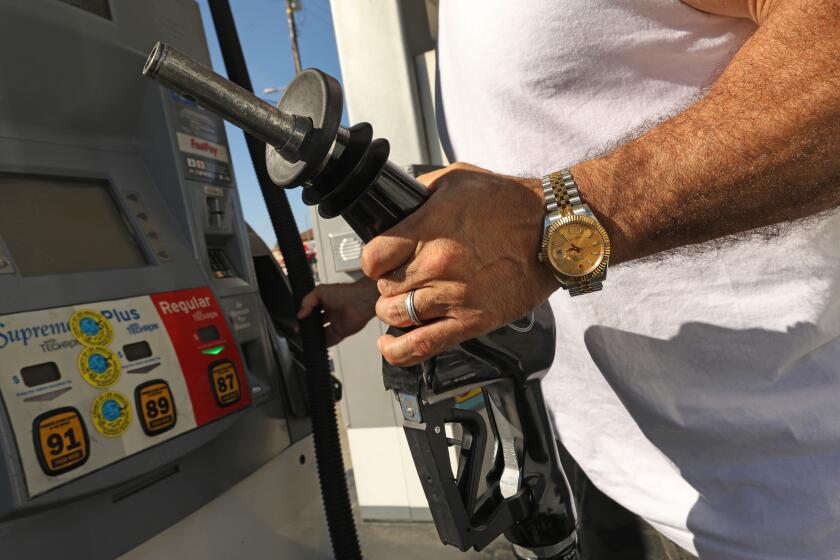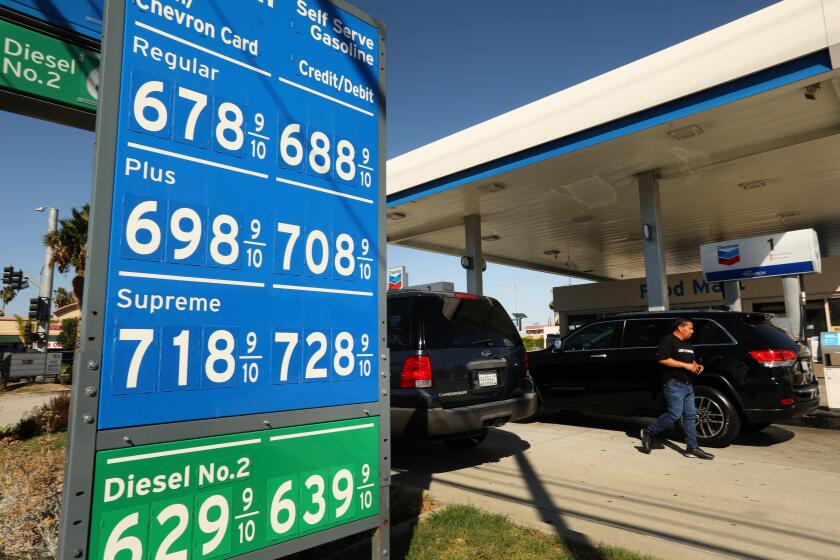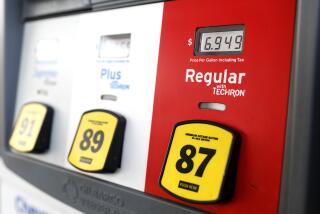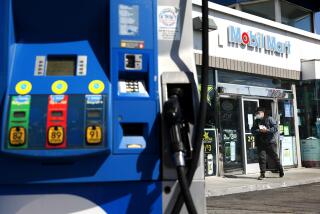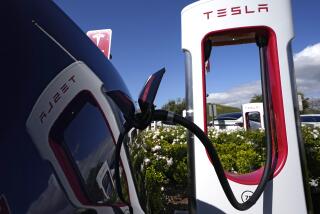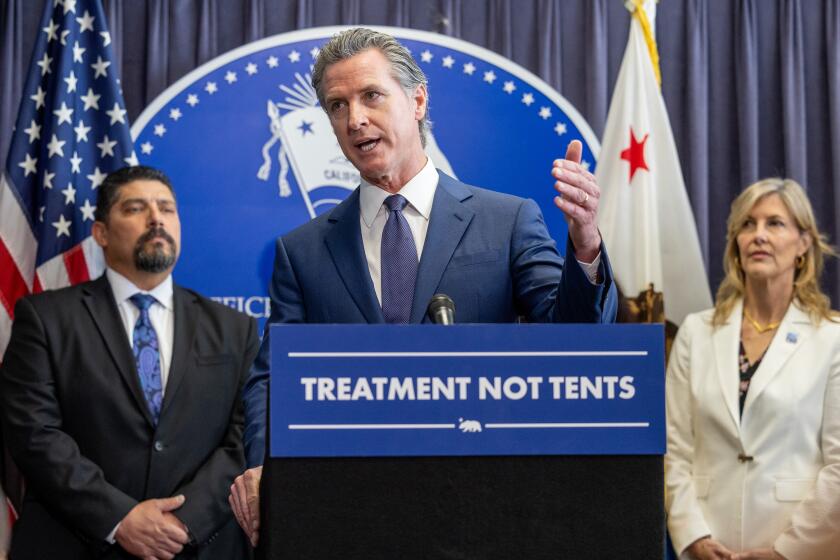Column: Penalizing high gas costs could be 2023’s biggest legislative fight. Hopefully, lawmakers learned from the past
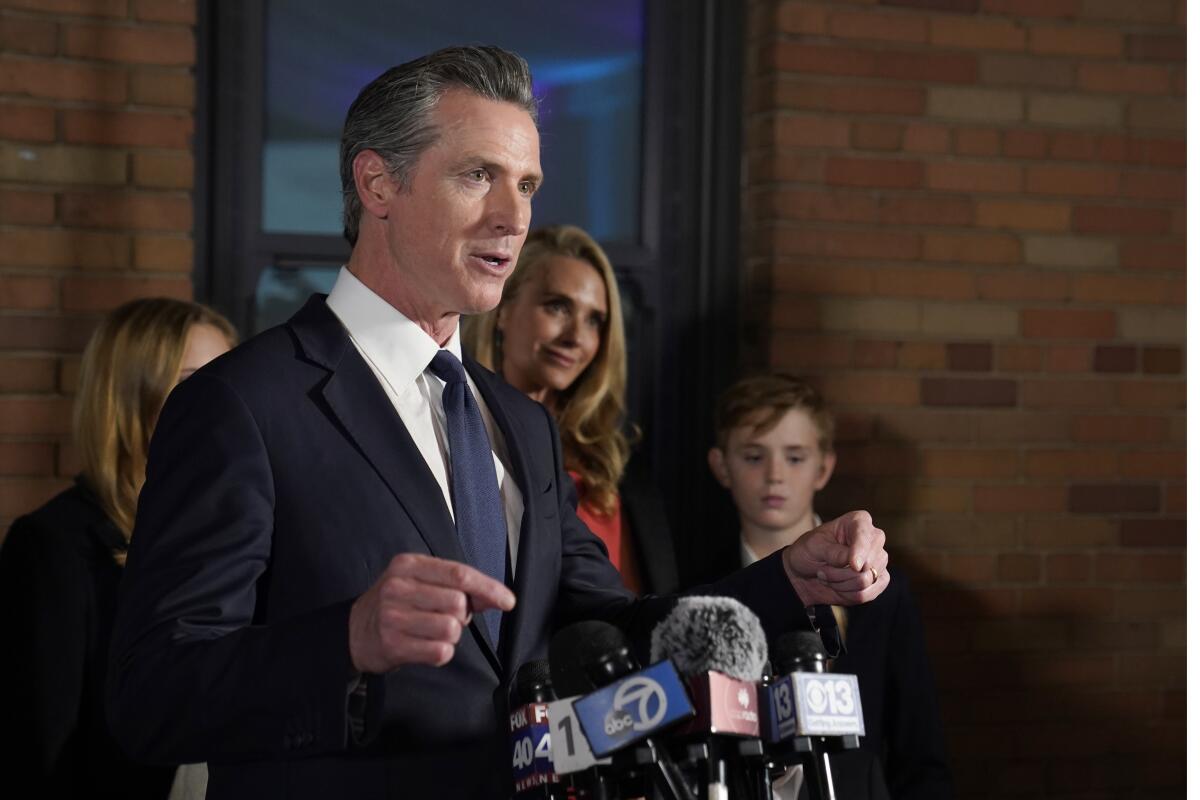
There are worse things than being gouged at the gas pump. You could be shut out at a dry pump.
There could be no gas at all to buy. Then there’d be long lines at stations that did offer gas. And you wouldn’t much care about the cost.
That’s not likely to happen under Gov. Gavin Newsom’s proposal to sock the “greedy” oil companies with a windfall profits tax. But it has in the terrible past so let’s hope our leaders have learned.
Correct the above: Newsom is now calling it a “penalty,” not a tax. Californians tend to rebel against taxes. And they’re harder to pass than a simple fine or penalty.
“I don’t care what he calls it,” says Catherine Reheis-Boyd, who heads the Western States Petroleum Assn. “It’s a bad idea.
“Is the governor of this state going to partner with our industry to continue to provide reliable, affordable fuel as we evolve into an alternative transportation system? Does he want to figure it out? Or does he just continue to demonize us?”
The gas supply has been reliable, no question. But has it been affordable? Not for lots of folks.
If Newsom and lawmakers aren’t careful in crafting their legislation to cap oil industry profits, they could end the reliability of gas supplies by discouraging production. Without the prospect of a reasonable profit, why bother?
Some of us remember severe fuel shortages and cars lined up for blocks back in the 1970s, waiting to get gas.
At Gov. Gavin Newsom’s urging, California lawmakers are expected to begin a special session Monday to consider a penalty on oil profits in response to high gas prices.
“I was 16 and had just gotten my license,” recalls Severin Borenstein, faculty director of the UC Berkeley Energy Institute.
“I’m concerned — worried we could wind up going down that road if we don’t design this legislation very carefully.”
It was a very bumpy road. Motorists began lining up at gas stations before dawn. There were fistfights. Pumps ran dry. Gas prices surged — the law of supply and demand. You could fill up only on certain days. The national speed limit was reduced to 55 mph.
Panic buying arrived in 1973 when Arab nation producers led by Saudi Arabia proclaimed an oil embargo on the United States and other countries that supported Israel in the Yom Kippur War.
But Borenstein says the biggest problem was that President Nixon imposed price controls on domestic oil and wouldn’t let them rise.
“Refineries had less incentive to produce gas,” he says. “That’s the lesson for today.”
Yes, Newsom is proposing to regulate refinery profits.
Gas lines returned in 1979 during the Iranian revolution. Iran drastically cut oil production, there were gas shortages and prices rose sharply.
President Carter suffered politically. Bumper stickers read: “Carter, Kiss My Gas.”
Borenstein says there are two ways we could suffer a return of the 1970s nightmares.
As California prices surged in recent days, Gov. Gavin Newsom proclaimed that he wanted to retaliate against oil moguls by imposing a windfall profits tax and returning the money to drivers.
One is if the governor and Legislature set allowable refinery profits that are too low.
“That would actually discourage the production of gasoline,” he says. “I’m guessing that won’t happen. But it will play out in the political process.”
The other way, the energy scholar says, is if refineries cut back on production because they fear being convicted as lawbreakers. Raising their prices to meet costs and paying a higher tax might be acceptable, he says. But it could be considered bad PR to be convicted of a crime — even if it’s only for making what the state considers an excessive profit.
“If there’s not enough gasoline, there will be a shortage and there will be gas lines,” Borenstein says. “And as much as people don’t like high prices, they really don’t like gas lines.”
The Newsom administration asserts that speculation about production rollbacks and gas shortages is nonsense.
“This is the biggest market in the country,” says Newsom spokesman Alex Stack. “Why would the industry give up billions of dollars in profit every year?
“The [profit] threshold will be set high enough so it will not remotely lead to supply shortages or lines. It just won’t happen.”
“I wasn’t alive in the ’70s, but we all learned a lot,” says Lauren Sanchez, the governor’s chief advisor on combating climate change. “We’re very focused on setting the [profit] threshold high enough. We’re not against making profit in California. We do want to avoid these massive price spikes that are really unexplained.”
Under the legislation, state government would obtain additional power to dig into the industry’s books and impose regulations. Bill sponsors point to electricity as an example.
But wait: Private energy companies such as Pacific Gas & Electric are granted monopolies over their territories and guaranteed profits. That’s not true with oil companies.
What really ticks off the industry are demagogic-sounding comments such as the one made by Newsom on Monday as he convened a special legislative session on excessive profits.
“California’s price-gouging penalty is simple — either Big Oil reins in the profits and prices or they’ll pay a penalty. Big Oil has been lying and gouging Californians to line their own pockets long enough.”
The industry blames recent high prices on increased production costs caused by state policies, including a reduction in oil drilling and stiffer regulations as California phases out fossil fuel use.
“The massive cost California is putting on consumers just to say, ‘We’re leaders,’ is irresponsible,” Reheis-Boyd asserts in a jab at Newsom.
By calling it an excessive profits “penalty” rather than a tax, that means the bill can pass the Legislature on a simple majority vote, rather than a supermajority.
“If it’s a majority vote bill, this Legislature is progressive enough that you could get a statue of Karl Marx erected in the rotunda,” says Democratic consultant David Townsend.
Perhaps. But the gas gouging bill may well generate the biggest legislative fight of 2023.
More to Read
Start your day right
Sign up for Essential California for news, features and recommendations from the L.A. Times and beyond in your inbox six days a week.
You may occasionally receive promotional content from the Los Angeles Times.
